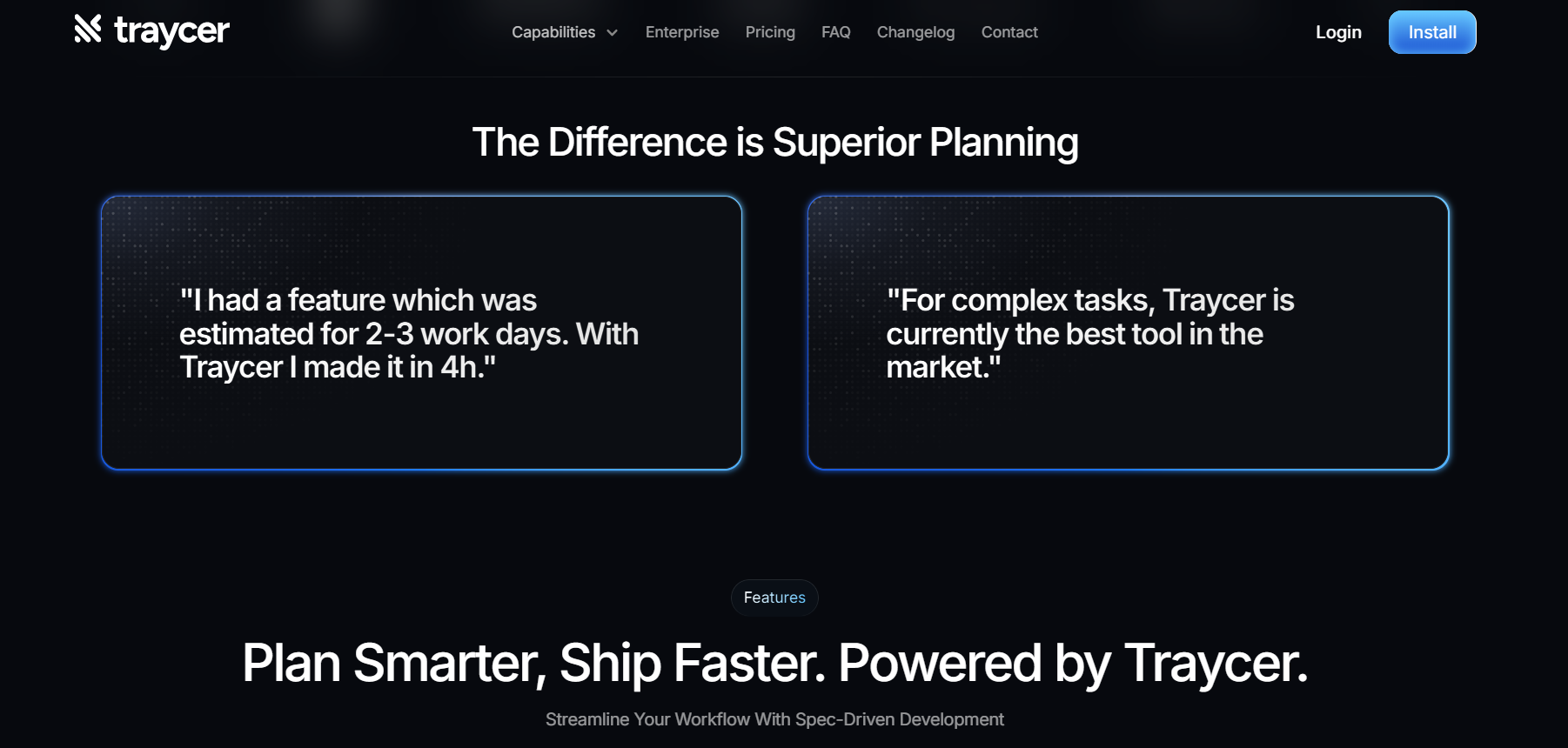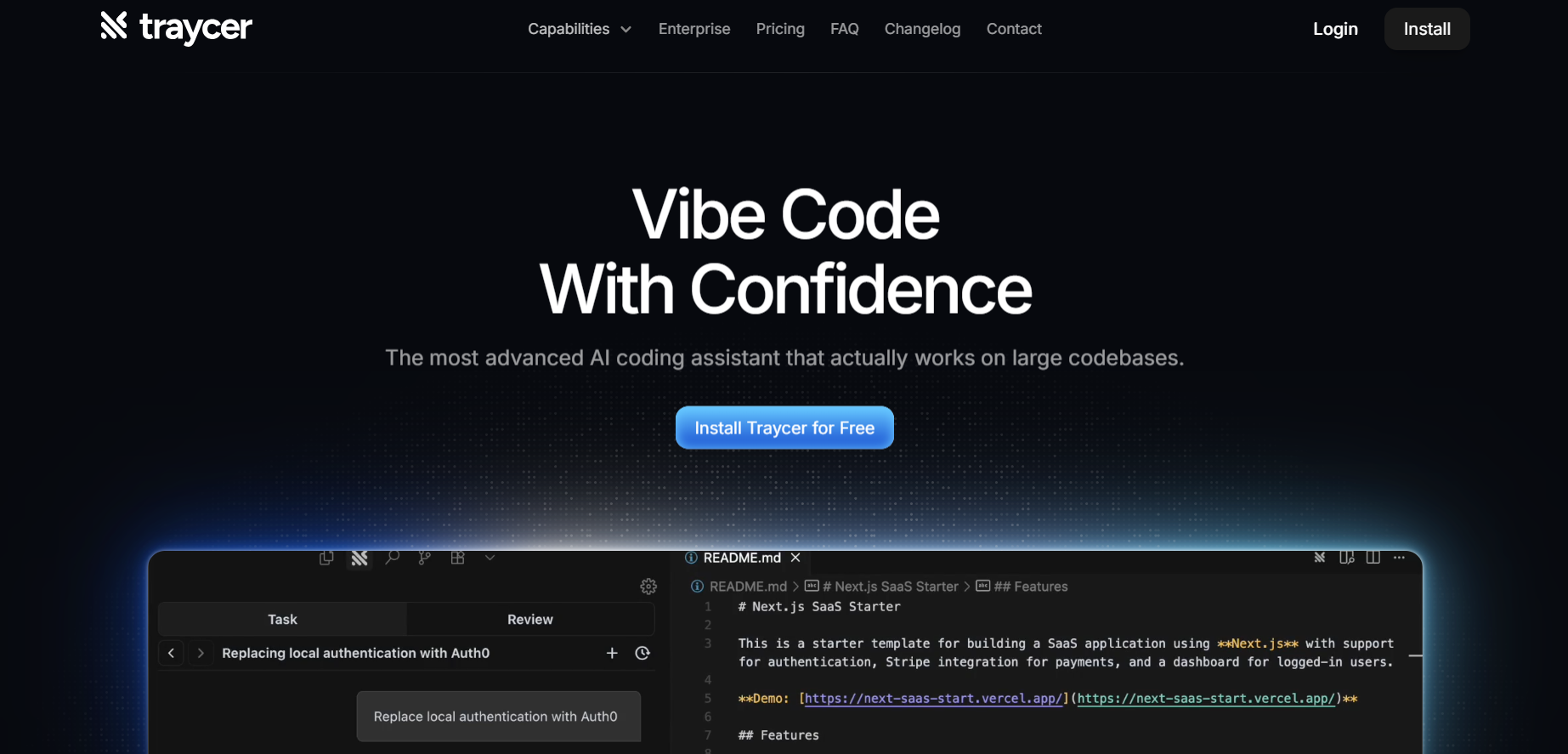
- Software Engineers & Developers: To manage complex changes in large codebases with structured planning.
- Technical Leads & Architects: To ensure consistent architecture and guardrails in feature development.
- DevOps & QA Teams: For automated verification and review of AI-generated code.
- Startups & Engineering Teams: To scale output without letting quality slip.
- Open Source Contributors: To more reliably apply patches with plan validation.
- Product & Feature Managers: To convert feature requests or tickets into actionable developer plans.
How to Use It?
- Install Traycer: Use the supported integrations (e.g., VSCode, Cursor, Windsurf) to embed Traycer in your workflow.
- Describe Your Task: Enter the feature change, refactor, or ticket you intend to work on.
- Generate Plan: Traycer analyzes your project context and generates a broken-down plan with detailed steps.
- Iterate on Plan: Modify or refine individual steps as needed before execution.
- Hand Off to Agent: Once the plan is acceptable, export it to your preferred AI coding agent to execute.
- Verify Changes: Traycer scans the resulting code changes and detects mismatches, regressions, or errors before merging.
- Use Ticket Assist: For GitHub workflows, import issues to Traycer and get ready-to-implement plans inside your IDE.
- Plan-First Approach: Instead of generating code blindly, it builds a layered plan that you can edit before any changes occur.
- Integration with Real Agents: Plans are portable to well-known AI coding agents for execution.
- Verification Layer: It checks AI outputs against constraints and context to reduce regressions.
- Task Chaining & Context Retention: Sequential tasks maintain full context, making multi-step workflows coherent.
- Ticket to Plan Alignment: GitHub issues can be converted automatically into actionable steps.
- IDE Embedded: Works where you code, not as a separate tool, giving live feedback and planning.
- Prevents “bad AI code” by forcing planning before execution
- Tight integration with existing development workflows
- Helps maintain quality with built-in verification
- Useful for both new features and large refactors
- Supports ticket-driven development
- Requires learning to write good tasks and inspect detailed plans
- AI agents’ output quality still depends on external AI models
- may have limits in extremely niche or legacy code contexts
- Verification might flag false positives in ambiguous code changes
- Premium features and capacity increasing may require higher tier
Free
Free
Lite
$ 10.00
Pro
$ 25.00
Proud of the love you're getting? Show off your AI Toolbook reviews—then invite more fans to share the love and build your credibility.
Add an AI Toolbook badge to your site—an easy way to drive followers, showcase updates, and collect reviews. It's like a mini 24/7 billboard for your AI.
Reviews
Rating Distribution
Average score
Popular Mention
FAQs
Yes — a free tier exists. Premium plans add higher capacity, auto-review, and more features.
It supports agents like Claude Code, Cursor, Windsurf, and others, allowing plan execution using your chosen model.
Yes — Traycer’s “Ticket Assist” turns GitHub issues into plans and imports them into your development environment.
Yes — in “Review” mode, it can scan modified or entire files for issues, performance problems, or quality fixes.
Traycer verifies changes and flags or corrects deviations to maintain consistency with the accepted plan.
Similar AI Tools
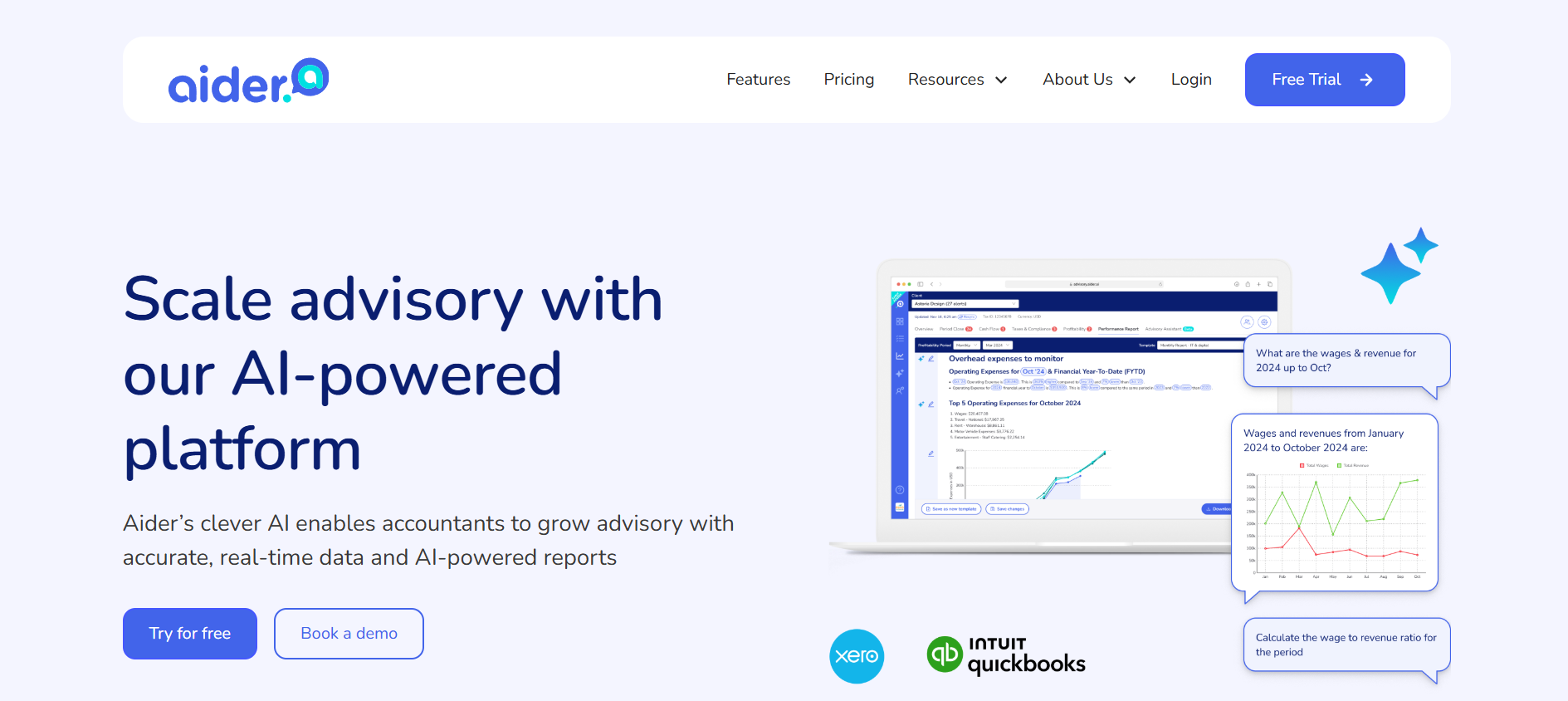
Aider
Aider.ai is an open-source AI-powered coding assistant that allows developers to collaborate with large language models like GPT-4 directly from the command line. It integrates seamlessly with Git, enabling conversational programming, code editing, and refactoring within your existing development workflow. With Aider, you can modify multiple files at once, get code explanations, and maintain clean version history—all from your terminal.

Aider
Aider.ai is an open-source AI-powered coding assistant that allows developers to collaborate with large language models like GPT-4 directly from the command line. It integrates seamlessly with Git, enabling conversational programming, code editing, and refactoring within your existing development workflow. With Aider, you can modify multiple files at once, get code explanations, and maintain clean version history—all from your terminal.

Aider
Aider.ai is an open-source AI-powered coding assistant that allows developers to collaborate with large language models like GPT-4 directly from the command line. It integrates seamlessly with Git, enabling conversational programming, code editing, and refactoring within your existing development workflow. With Aider, you can modify multiple files at once, get code explanations, and maintain clean version history—all from your terminal.
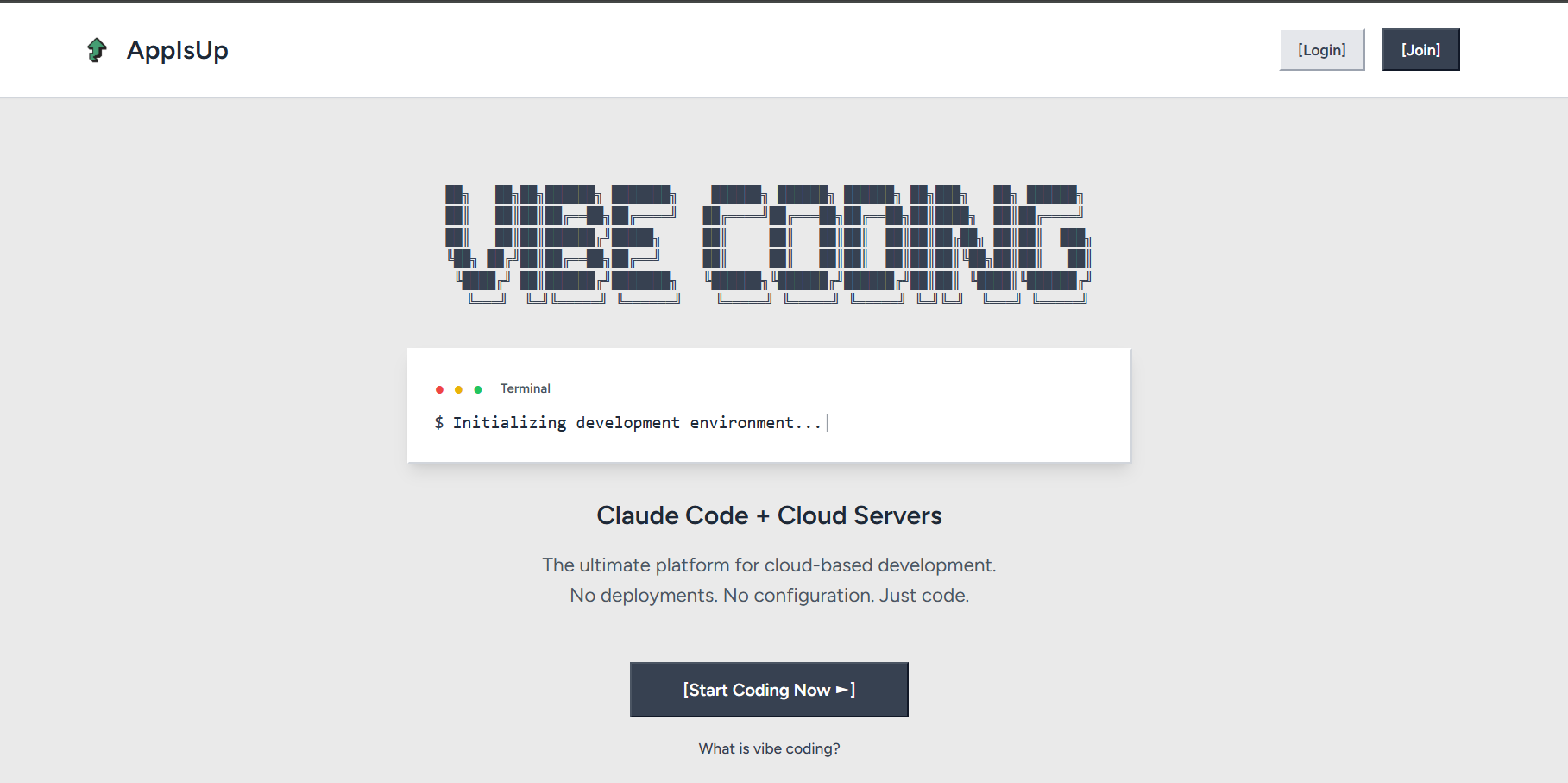

AppIsUp
AppIsUp is a modern “vibe coding” platform that connects AI (Claude by Anthropic) with cloud hosting so developers can code from anywhere and share their work instantly. It aims to simplify the process of getting projects online by giving you instant public URLs for whatever you build. The platform supports live editing and collaboration, so you can iterate quickly and test changes in real time.


AppIsUp
AppIsUp is a modern “vibe coding” platform that connects AI (Claude by Anthropic) with cloud hosting so developers can code from anywhere and share their work instantly. It aims to simplify the process of getting projects online by giving you instant public URLs for whatever you build. The platform supports live editing and collaboration, so you can iterate quickly and test changes in real time.


AppIsUp
AppIsUp is a modern “vibe coding” platform that connects AI (Claude by Anthropic) with cloud hosting so developers can code from anywhere and share their work instantly. It aims to simplify the process of getting projects online by giving you instant public URLs for whatever you build. The platform supports live editing and collaboration, so you can iterate quickly and test changes in real time.

Kiro AI
Kiro.dev is a powerful AI-powered code generation tool designed to accelerate the software development process. It leverages advanced machine learning models to help developers write code faster, more efficiently, and with fewer errors. Kiro.dev offers various features, including code completion, code generation from natural language prompts, and code explanation, making it a valuable asset for developers of all skill levels.

Kiro AI
Kiro.dev is a powerful AI-powered code generation tool designed to accelerate the software development process. It leverages advanced machine learning models to help developers write code faster, more efficiently, and with fewer errors. Kiro.dev offers various features, including code completion, code generation from natural language prompts, and code explanation, making it a valuable asset for developers of all skill levels.

Kiro AI
Kiro.dev is a powerful AI-powered code generation tool designed to accelerate the software development process. It leverages advanced machine learning models to help developers write code faster, more efficiently, and with fewer errors. Kiro.dev offers various features, including code completion, code generation from natural language prompts, and code explanation, making it a valuable asset for developers of all skill levels.
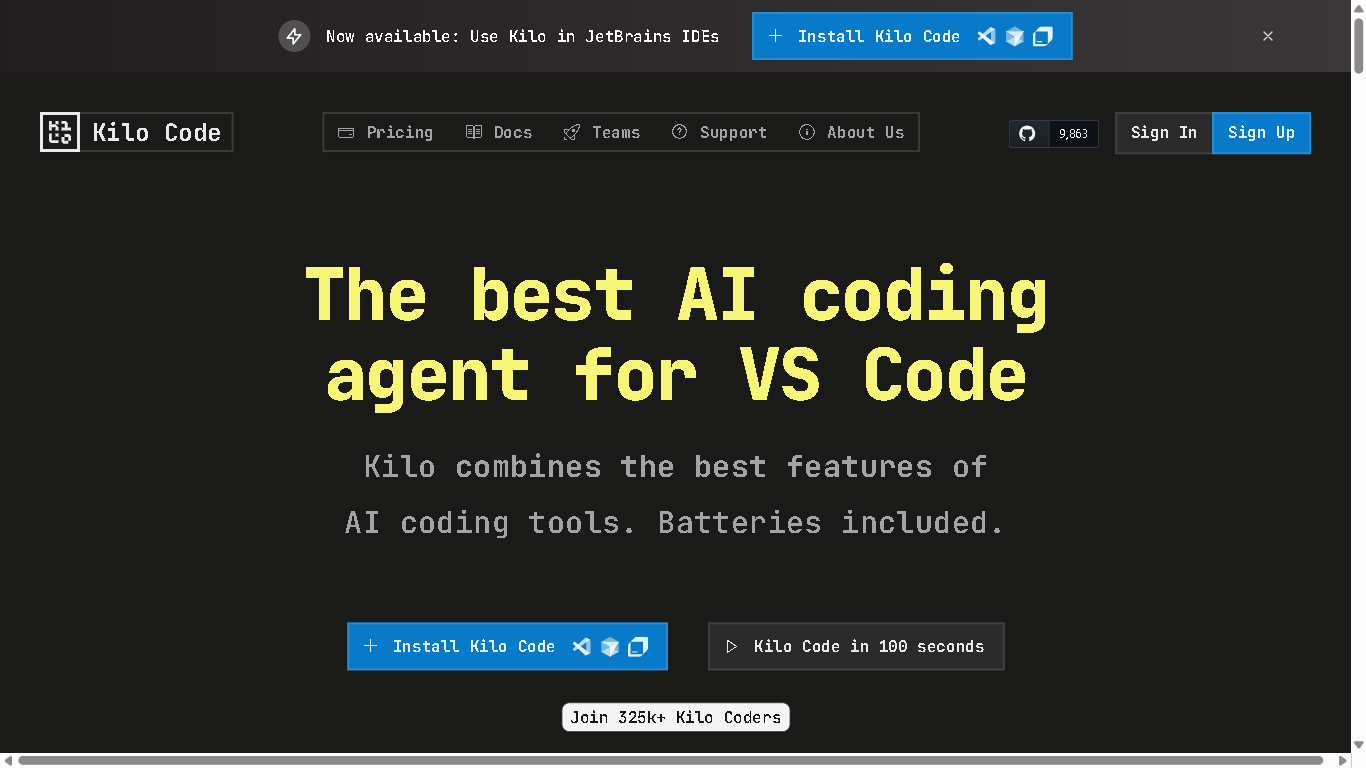

Kilo Code
Kilo Code is an AI-powered coding assistant designed to enhance software development within IDEs like Visual Studio Code and JetBrains. It integrates features from existing AI coding tools while providing unique functionalities such as the Model Context Protocol (MCP) Server Marketplace and intelligent system notifications. Kilo Code streamlines development by automating repetitive tasks, generating code from natural language prompts, and providing intelligent suggestions to developers.


Kilo Code
Kilo Code is an AI-powered coding assistant designed to enhance software development within IDEs like Visual Studio Code and JetBrains. It integrates features from existing AI coding tools while providing unique functionalities such as the Model Context Protocol (MCP) Server Marketplace and intelligent system notifications. Kilo Code streamlines development by automating repetitive tasks, generating code from natural language prompts, and providing intelligent suggestions to developers.


Kilo Code
Kilo Code is an AI-powered coding assistant designed to enhance software development within IDEs like Visual Studio Code and JetBrains. It integrates features from existing AI coding tools while providing unique functionalities such as the Model Context Protocol (MCP) Server Marketplace and intelligent system notifications. Kilo Code streamlines development by automating repetitive tasks, generating code from natural language prompts, and providing intelligent suggestions to developers.
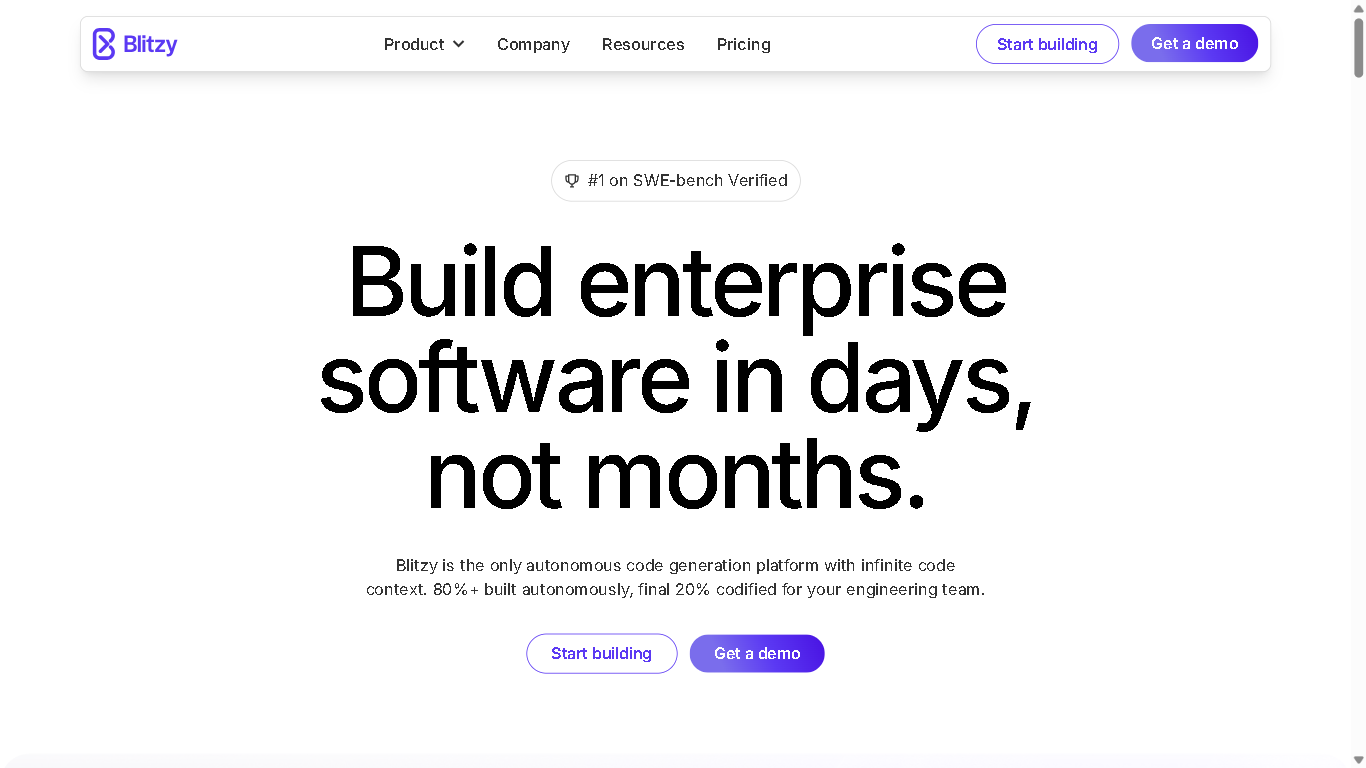
Blitzy
Blitzy is an AI-powered autonomous software development platform designed to accelerate enterprise-grade software creation. It automates over 80% of the development process, enabling teams to transform six-month projects into six-day turnarounds. Blitzy utilizes a multi-agent System 2 AI architecture to reason deeply across entire codebases, providing high-quality, production-ready code validated at both compile and runtime.

Blitzy
Blitzy is an AI-powered autonomous software development platform designed to accelerate enterprise-grade software creation. It automates over 80% of the development process, enabling teams to transform six-month projects into six-day turnarounds. Blitzy utilizes a multi-agent System 2 AI architecture to reason deeply across entire codebases, providing high-quality, production-ready code validated at both compile and runtime.

Blitzy
Blitzy is an AI-powered autonomous software development platform designed to accelerate enterprise-grade software creation. It automates over 80% of the development process, enabling teams to transform six-month projects into six-day turnarounds. Blitzy utilizes a multi-agent System 2 AI architecture to reason deeply across entire codebases, providing high-quality, production-ready code validated at both compile and runtime.


Roo Code
Roo Code is an open-source AI-powered coding assistant available on GitHub through the RooVetGit repository. It integrates directly with Visual Studio Code, providing developers with an autonomous “AI dev team” that can plan, write, debug, and refactor code across multiple files. Built as a fork of the earlier Roo Cline project, Roo Code uses agentic modes—such as Code, Architect, Ask, and Debug—to handle distinct development tasks. Developers can customize modes, connect various AI model providers, and fine-tune workflows for maximum control. Fully open-source, it supports local and cloud-based models while prioritizing privacy and flexibility.


Roo Code
Roo Code is an open-source AI-powered coding assistant available on GitHub through the RooVetGit repository. It integrates directly with Visual Studio Code, providing developers with an autonomous “AI dev team” that can plan, write, debug, and refactor code across multiple files. Built as a fork of the earlier Roo Cline project, Roo Code uses agentic modes—such as Code, Architect, Ask, and Debug—to handle distinct development tasks. Developers can customize modes, connect various AI model providers, and fine-tune workflows for maximum control. Fully open-source, it supports local and cloud-based models while prioritizing privacy and flexibility.


Roo Code
Roo Code is an open-source AI-powered coding assistant available on GitHub through the RooVetGit repository. It integrates directly with Visual Studio Code, providing developers with an autonomous “AI dev team” that can plan, write, debug, and refactor code across multiple files. Built as a fork of the earlier Roo Cline project, Roo Code uses agentic modes—such as Code, Architect, Ask, and Debug—to handle distinct development tasks. Developers can customize modes, connect various AI model providers, and fine-tune workflows for maximum control. Fully open-source, it supports local and cloud-based models while prioritizing privacy and flexibility.
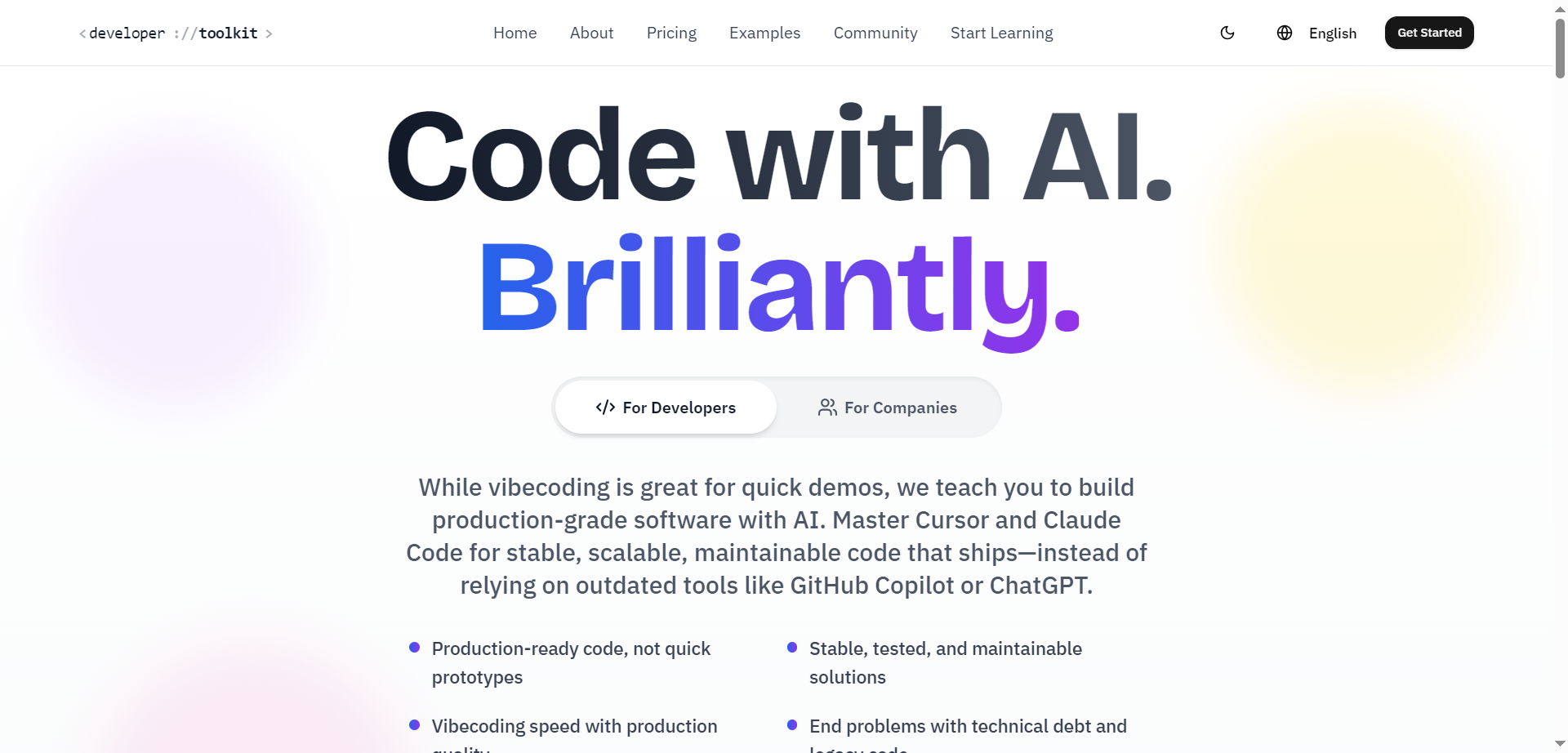
Developer Toolkit
DeveloperToolkit.ai is an advanced AI-assisted development platform designed to help developers build production-grade, scalable, and maintainable software. It leverages powerful models like Claude Code and Cursor to generate production-ready code that’s secure, tested, and optimized for real-world deployment. Unlike tools that stop at quick prototypes, DeveloperToolkit.ai focuses on long-term code quality, maintainability, and best practices. Whether writing API endpoints, components, or full-fledged systems, it accelerates the entire development process while ensuring cleaner architectures and stable results fit for teams that ship with confidence.

Developer Toolkit
DeveloperToolkit.ai is an advanced AI-assisted development platform designed to help developers build production-grade, scalable, and maintainable software. It leverages powerful models like Claude Code and Cursor to generate production-ready code that’s secure, tested, and optimized for real-world deployment. Unlike tools that stop at quick prototypes, DeveloperToolkit.ai focuses on long-term code quality, maintainability, and best practices. Whether writing API endpoints, components, or full-fledged systems, it accelerates the entire development process while ensuring cleaner architectures and stable results fit for teams that ship with confidence.

Developer Toolkit
DeveloperToolkit.ai is an advanced AI-assisted development platform designed to help developers build production-grade, scalable, and maintainable software. It leverages powerful models like Claude Code and Cursor to generate production-ready code that’s secure, tested, and optimized for real-world deployment. Unlike tools that stop at quick prototypes, DeveloperToolkit.ai focuses on long-term code quality, maintainability, and best practices. Whether writing API endpoints, components, or full-fledged systems, it accelerates the entire development process while ensuring cleaner architectures and stable results fit for teams that ship with confidence.
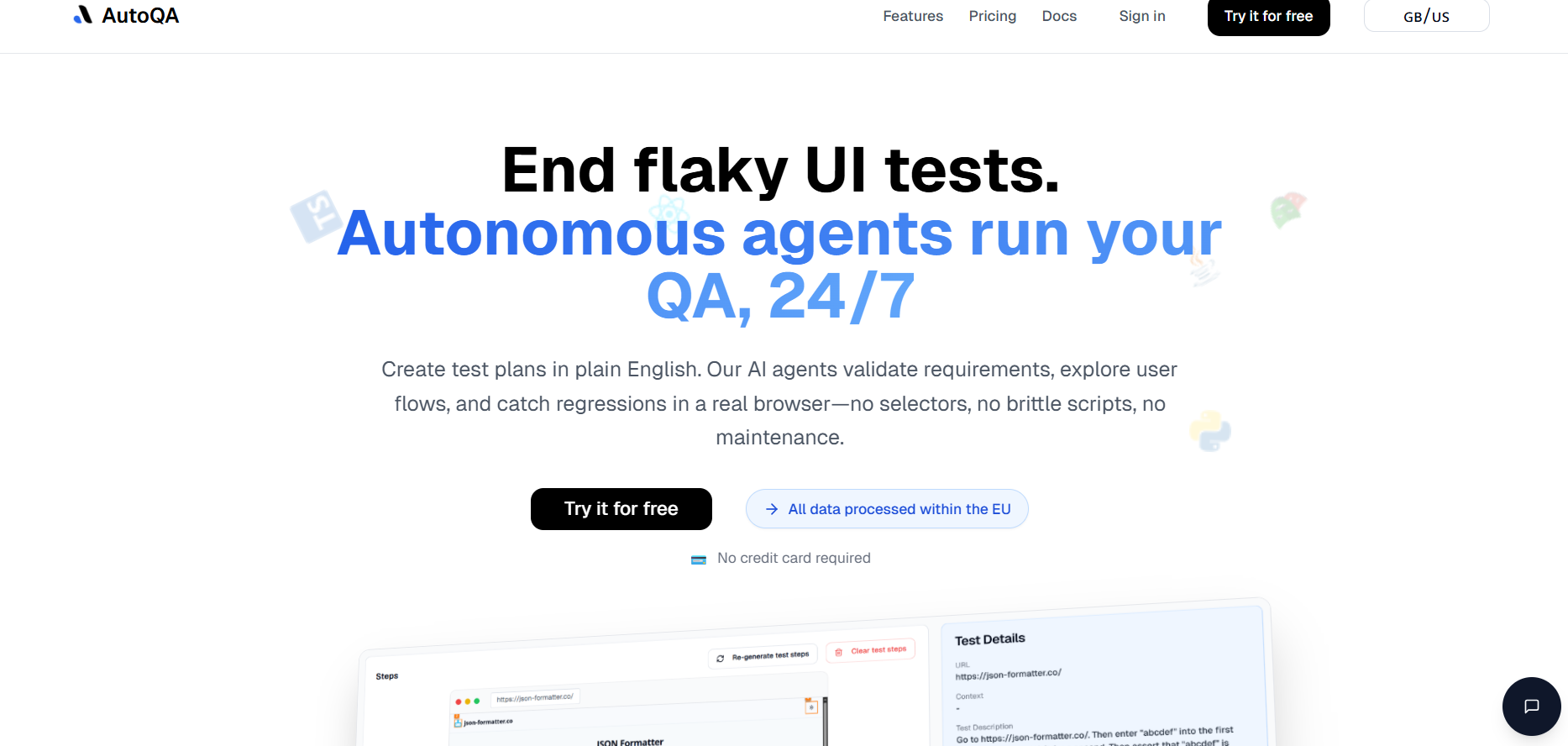

Auto QA
AutoQA is an AI-powered automated testing platform designed to help software teams build reliable applications faster. It enables teams to create, run and manage test plans with intelligent automation, reducing manual effort and improving test coverage. The solution supports automated test execution, reporting and integration into CI/CD pipelines—making it especially useful for agile teams seeking higher quality and faster releases


Auto QA
AutoQA is an AI-powered automated testing platform designed to help software teams build reliable applications faster. It enables teams to create, run and manage test plans with intelligent automation, reducing manual effort and improving test coverage. The solution supports automated test execution, reporting and integration into CI/CD pipelines—making it especially useful for agile teams seeking higher quality and faster releases


Auto QA
AutoQA is an AI-powered automated testing platform designed to help software teams build reliable applications faster. It enables teams to create, run and manage test plans with intelligent automation, reducing manual effort and improving test coverage. The solution supports automated test execution, reporting and integration into CI/CD pipelines—making it especially useful for agile teams seeking higher quality and faster releases
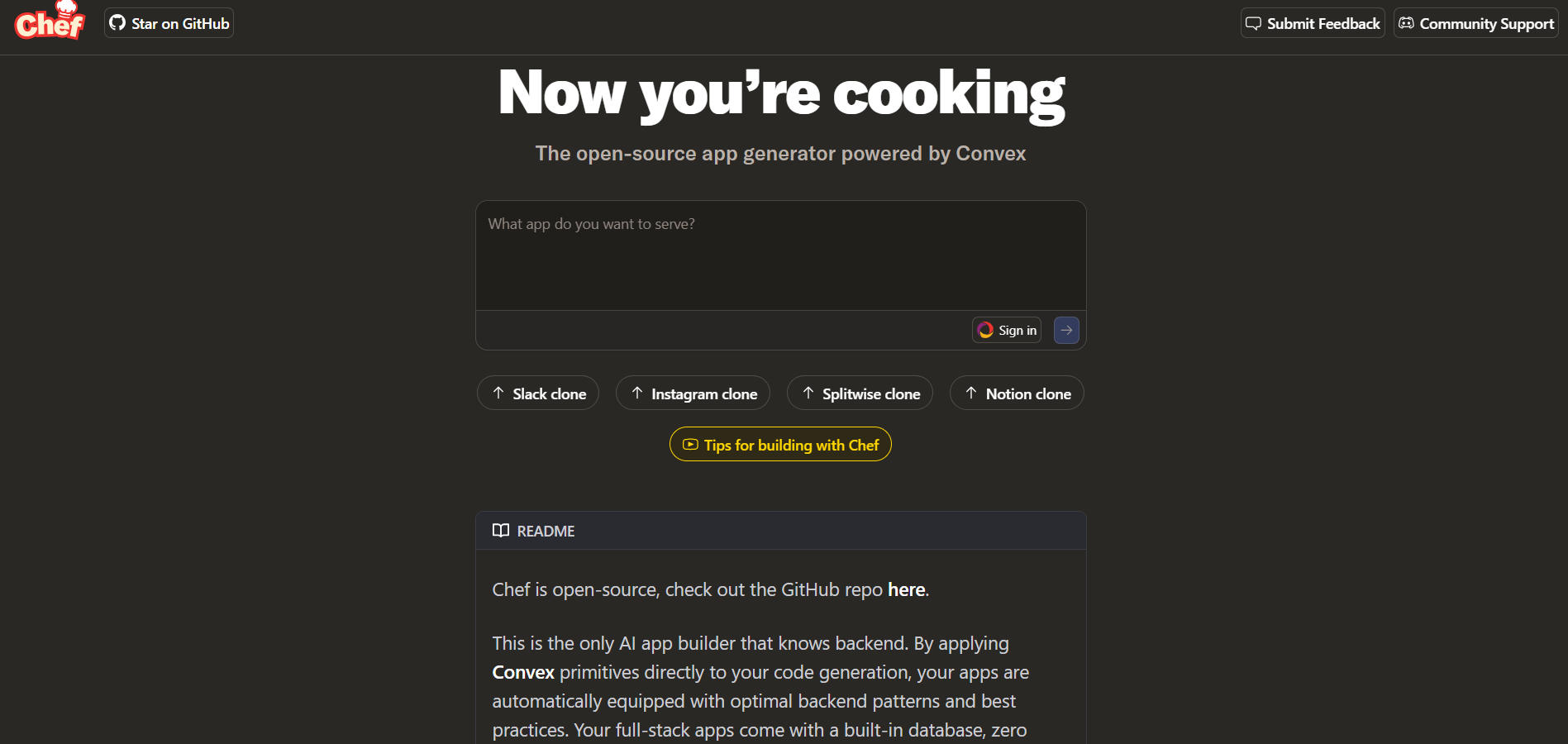

Chef
Chef by Convex is an AI-powered development assistant built to help developers create, test, and deploy web applications faster using natural language prompts. Integrated with Convex’s backend-as-a-service platform, Chef automates code generation, database setup, and API creation, enabling developers to move from concept to functional prototype within minutes. The tool understands developer intent, allowing users to describe what they want and instantly receive production-ready code snippets. With collaborative features and integrated testing environments, Chef by Convex simplifies modern app development for both individuals and teams, combining AI intelligence with backend scalability.


Chef
Chef by Convex is an AI-powered development assistant built to help developers create, test, and deploy web applications faster using natural language prompts. Integrated with Convex’s backend-as-a-service platform, Chef automates code generation, database setup, and API creation, enabling developers to move from concept to functional prototype within minutes. The tool understands developer intent, allowing users to describe what they want and instantly receive production-ready code snippets. With collaborative features and integrated testing environments, Chef by Convex simplifies modern app development for both individuals and teams, combining AI intelligence with backend scalability.


Chef
Chef by Convex is an AI-powered development assistant built to help developers create, test, and deploy web applications faster using natural language prompts. Integrated with Convex’s backend-as-a-service platform, Chef automates code generation, database setup, and API creation, enabling developers to move from concept to functional prototype within minutes. The tool understands developer intent, allowing users to describe what they want and instantly receive production-ready code snippets. With collaborative features and integrated testing environments, Chef by Convex simplifies modern app development for both individuals and teams, combining AI intelligence with backend scalability.
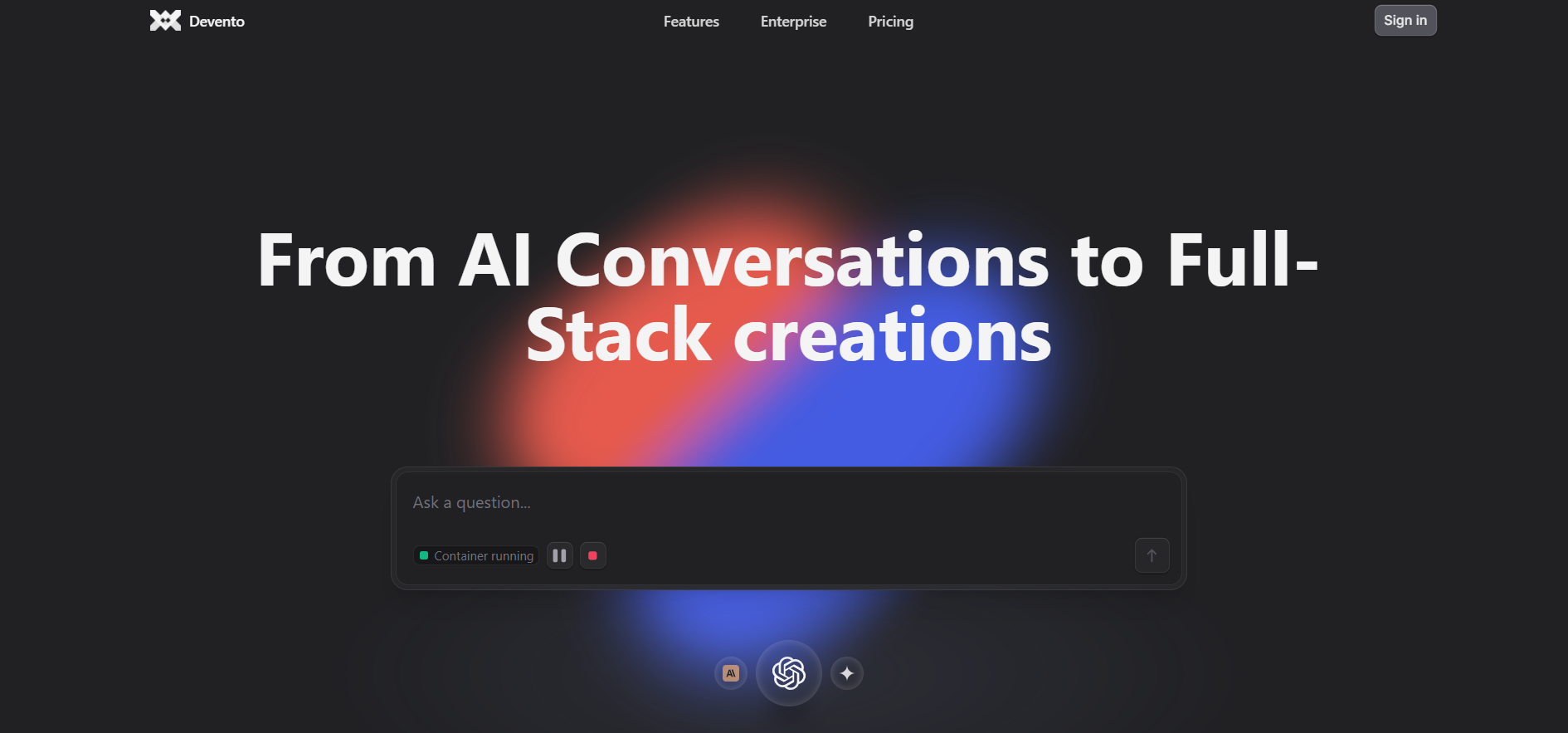

Devento AI
Devento AI is a comprehensive AI marketing and automation platform designed to help businesses create, manage, and optimize their digital marketing campaigns effortlessly. It combines natural language processing, predictive analytics, and automation to craft tailored marketing content and data-driven campaigns. With Devento AI, users can generate ad copies, schedule posts, manage audience targeting, and track performance across platforms — all from a single dashboard. The tool empowers marketers and agencies to enhance engagement, boost ROI, and streamline operations through automation.


Devento AI
Devento AI is a comprehensive AI marketing and automation platform designed to help businesses create, manage, and optimize their digital marketing campaigns effortlessly. It combines natural language processing, predictive analytics, and automation to craft tailored marketing content and data-driven campaigns. With Devento AI, users can generate ad copies, schedule posts, manage audience targeting, and track performance across platforms — all from a single dashboard. The tool empowers marketers and agencies to enhance engagement, boost ROI, and streamline operations through automation.


Devento AI
Devento AI is a comprehensive AI marketing and automation platform designed to help businesses create, manage, and optimize their digital marketing campaigns effortlessly. It combines natural language processing, predictive analytics, and automation to craft tailored marketing content and data-driven campaigns. With Devento AI, users can generate ad copies, schedule posts, manage audience targeting, and track performance across platforms — all from a single dashboard. The tool empowers marketers and agencies to enhance engagement, boost ROI, and streamline operations through automation.
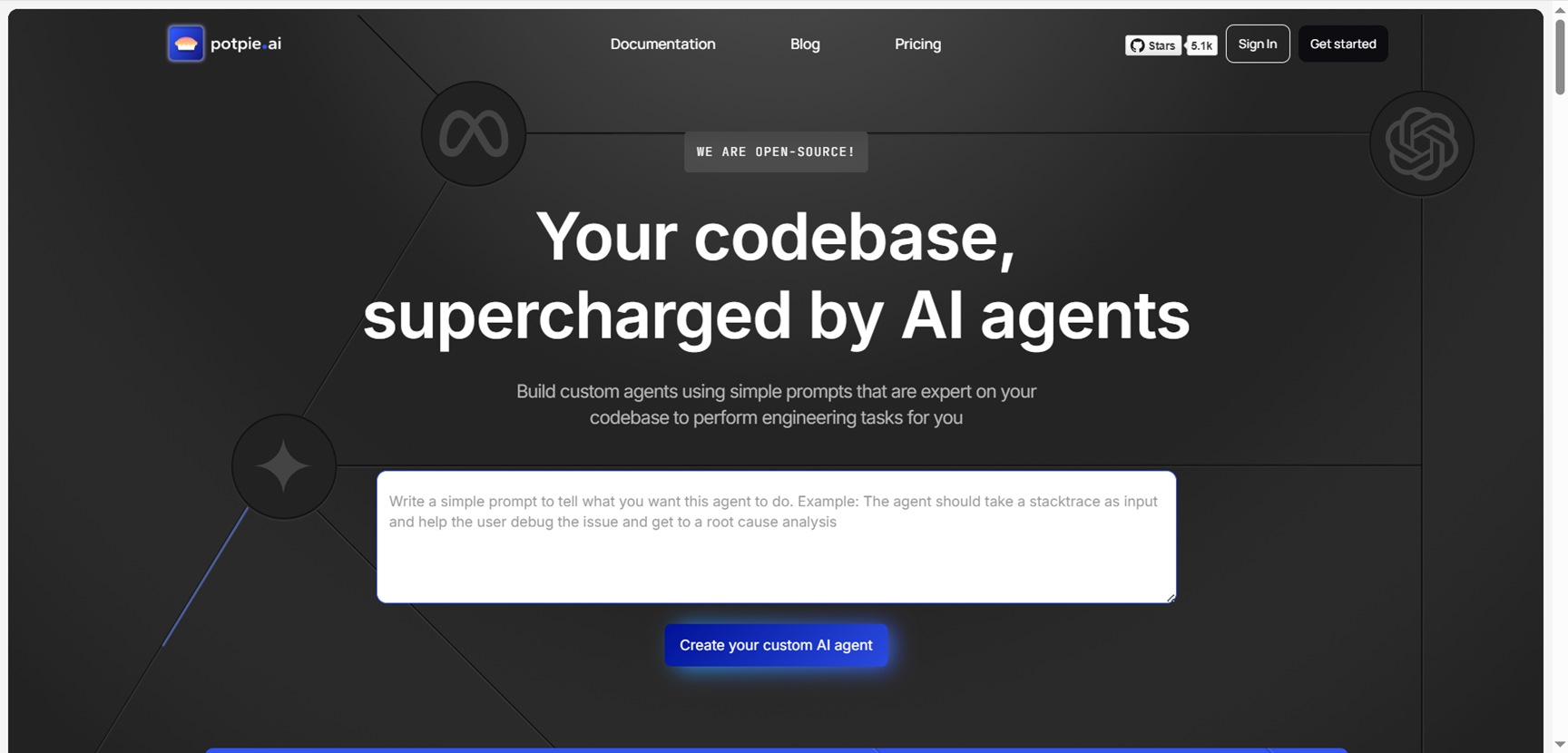

potpie.ai
Potpie.ai is an innovative AI agent platform that enables developers to create intelligent agents for their codebase in just minutes, transforming software development through automated understanding and interaction. Designed specifically for codebase analysis, it allows users to deploy AI agents that comprehend entire repositories, perform tasks like code reviews, bug detection, refactoring suggestions, and feature implementation autonomously. The platform emphasizes speed and simplicity, requiring minimal setup to integrate with existing projects on GitHub or local environments. Key capabilities include natural language queries for code exploration, multi-agent collaboration for complex workflows, and seamless integration with popular IDEs like VS Code. By leveraging advanced LLMs fine-tuned for code, Potpie.ai boosts productivity for solo developers and teams alike, making AI-assisted coding accessible without deep expertise.


potpie.ai
Potpie.ai is an innovative AI agent platform that enables developers to create intelligent agents for their codebase in just minutes, transforming software development through automated understanding and interaction. Designed specifically for codebase analysis, it allows users to deploy AI agents that comprehend entire repositories, perform tasks like code reviews, bug detection, refactoring suggestions, and feature implementation autonomously. The platform emphasizes speed and simplicity, requiring minimal setup to integrate with existing projects on GitHub or local environments. Key capabilities include natural language queries for code exploration, multi-agent collaboration for complex workflows, and seamless integration with popular IDEs like VS Code. By leveraging advanced LLMs fine-tuned for code, Potpie.ai boosts productivity for solo developers and teams alike, making AI-assisted coding accessible without deep expertise.


potpie.ai
Potpie.ai is an innovative AI agent platform that enables developers to create intelligent agents for their codebase in just minutes, transforming software development through automated understanding and interaction. Designed specifically for codebase analysis, it allows users to deploy AI agents that comprehend entire repositories, perform tasks like code reviews, bug detection, refactoring suggestions, and feature implementation autonomously. The platform emphasizes speed and simplicity, requiring minimal setup to integrate with existing projects on GitHub or local environments. Key capabilities include natural language queries for code exploration, multi-agent collaboration for complex workflows, and seamless integration with popular IDEs like VS Code. By leveraging advanced LLMs fine-tuned for code, Potpie.ai boosts productivity for solo developers and teams alike, making AI-assisted coding accessible without deep expertise.
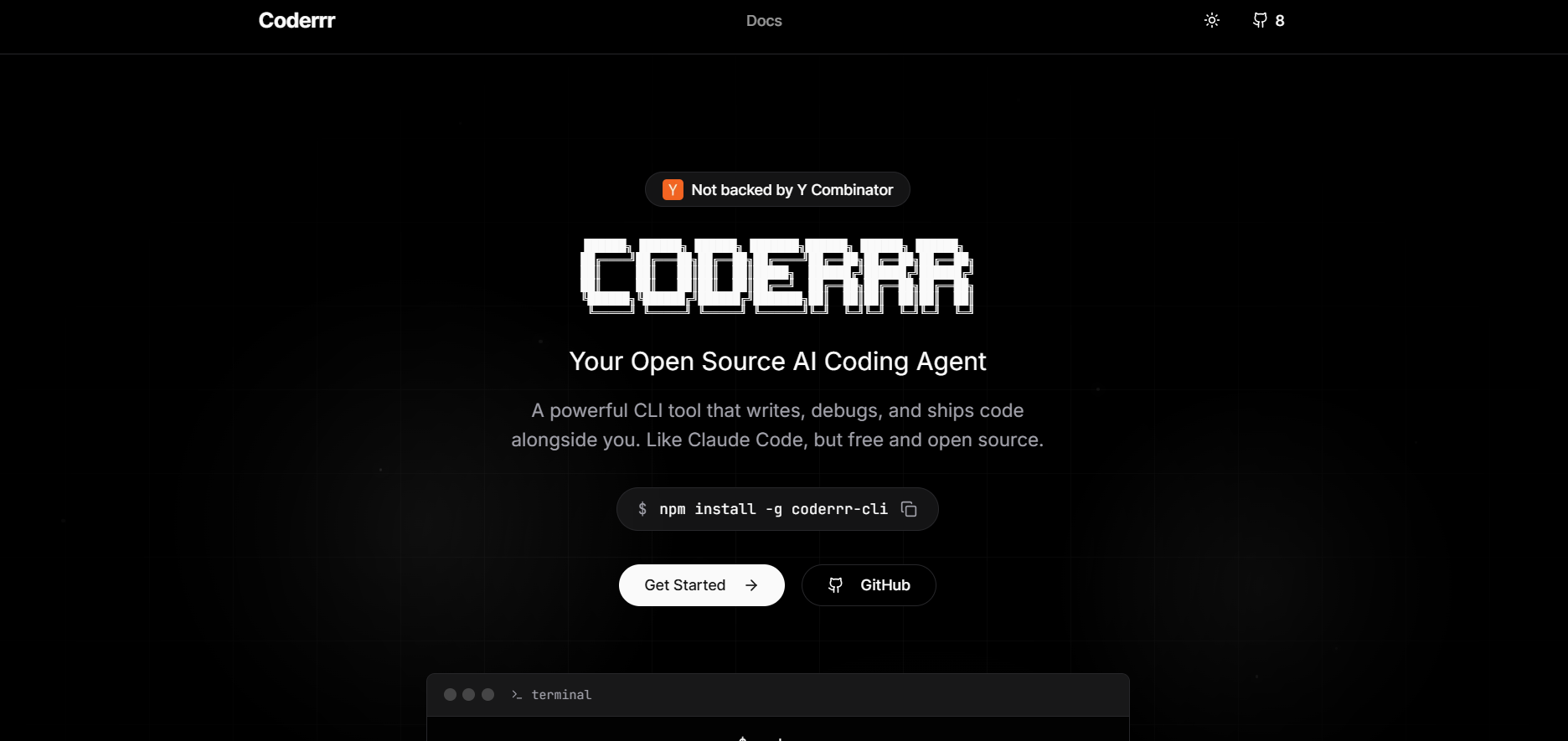
coderrr
Coderrr is an open-source AI coding agent delivered as a powerful command-line interface tool that works alongside developers to write, debug, and ship code efficiently. Designed as a free and open alternative to proprietary AI coding assistants, Coderrr integrates directly into the developer workflow without locking users into closed ecosystems. It assists with code generation, error diagnosis, refactoring, and implementation tasks directly from the terminal, making it especially useful for developers who prefer CLI-first environments. By being fully open source, Coderrr allows transparency, customization, and community-driven improvements while still delivering practical AI-assisted development capabilities.

coderrr
Coderrr is an open-source AI coding agent delivered as a powerful command-line interface tool that works alongside developers to write, debug, and ship code efficiently. Designed as a free and open alternative to proprietary AI coding assistants, Coderrr integrates directly into the developer workflow without locking users into closed ecosystems. It assists with code generation, error diagnosis, refactoring, and implementation tasks directly from the terminal, making it especially useful for developers who prefer CLI-first environments. By being fully open source, Coderrr allows transparency, customization, and community-driven improvements while still delivering practical AI-assisted development capabilities.

coderrr
Coderrr is an open-source AI coding agent delivered as a powerful command-line interface tool that works alongside developers to write, debug, and ship code efficiently. Designed as a free and open alternative to proprietary AI coding assistants, Coderrr integrates directly into the developer workflow without locking users into closed ecosystems. It assists with code generation, error diagnosis, refactoring, and implementation tasks directly from the terminal, making it especially useful for developers who prefer CLI-first environments. By being fully open source, Coderrr allows transparency, customization, and community-driven improvements while still delivering practical AI-assisted development capabilities.
Editorial Note
This page was researched and written by the ATB Editorial Team. Our team researches each AI tool by reviewing its official website, testing features, exploring real use cases, and considering user feedback. Every page is fact-checked and regularly updated to ensure the information stays accurate, neutral, and useful for our readers.
If you have any suggestions or questions, email us at hello@aitoolbook.ai

